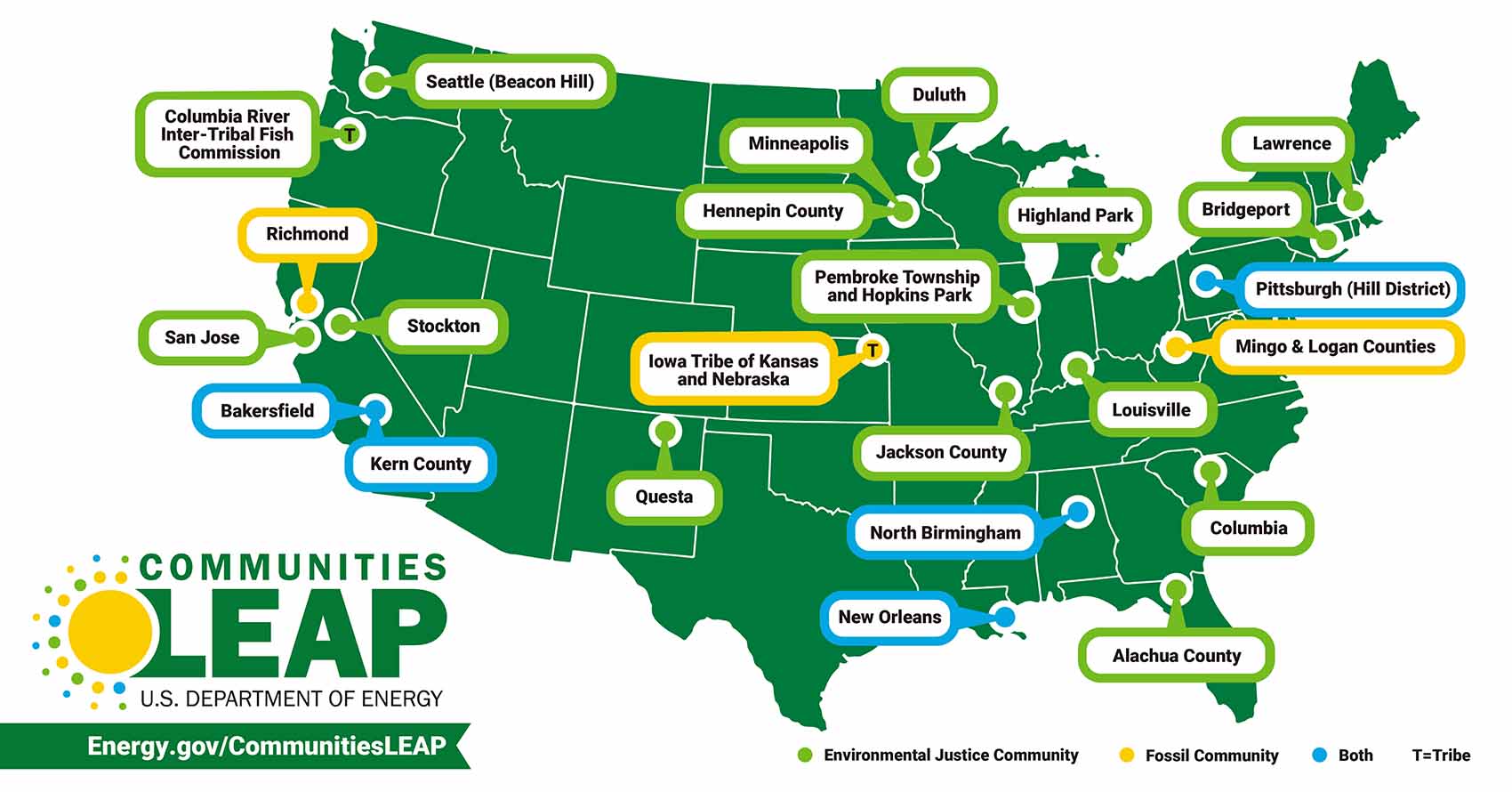NREL Technical Assistance Advances Community Clean Energy Goals Through Communities LEAP Pilot
The U.S. Department of Energy (DOE) and the National Renewable Energy Laboratory (NREL) have a long history of partnering on a wide range of technical assistance programs to make renewable energy goals and priorities a reality for communities across the country.
The ambition to support these communities can be understood through the Communities Local Energy Action Program (Communities LEAP) pilot, an initiative designed for low-income, energy-burdened communities that have experienced environmental impacts or direct economic impacts from a shift away from a historical reliance on fossil fuels. Through participation, communities create customized energy plans based on their needs, resources, and goals.

Energy planning is complex, so Communities LEAP takes a place-based approach designed to account for the wide variety of renewable energy solutions that can advance each community’s unique priorities, which include economic development, environmental quality, and health benefits. Over the last 18 months, 24 communities across 17 states formed coalitions and were partnered with one or more community leads from the Communities LEAP technical assistance provider network to develop customized technical assistance.
Community coalitions included at least one government partner (local, state, or Tribal) and one community-based organization to support decision-making and provide input based on the community’s perspective. Coalitions comprised government entities, community-based organizations, businesses, residents, and other community partners, including nonprofits, academic institutions, and utilities.
The technical assistance provider network was led by NREL, which supported 22 of the 24 communities focused on renewable energy pathways. Two communities, focused on carbon capture and storage, worked with Lawrence Livermore National Laboratory and the National Energy Technology Laboratory, respectively, in coordination with DOE’s Office of Fossil Energy and Carbon Management.
The diversity of technical assistance delivered over 18 months can be found in the recently published Communities LEAP pilot final report. The report details the three distinct phases of the initiative and highlights use cases that present the breadth of NREL’s research expertise using cutting-edge, in-house analysis and modeling tools. Tools such as ResStock™, REopt®, and the State and Local Planning for Energy (SLOPE) Platform enabled communities to make informed decisions on energy efficiency, solar deployment, advanced energy strategies, and more.
In Columbia, South Carolina, NREL used ResStock to model the impact of energy efficiency retrofits on the local housing stock, focusing on low-income homes with significant energy burdens. The analysis found that basic envelope upgrades, like adding insulation to walls and sealing gaps around doors and windows, are the most cost-effective for lowering energy consumption and reducing energy bills. These results will support community leaders to promote and prioritize energy efficiency improvements that will benefit their residents.
ResStock was critical in helping Columbia, along with several other pilot communities, understand the energy challenges of their housing stock and identify the most cost-effective energy efficiency options. We hope that this support leads to improved energy security and more comfortable living environments for those who need it."
In Minneapolis, Minnesota, the community identified three resilience hubs (the Sabathani Center, the Minneapolis American Indian Center, and the Renewable Energy Partners North Minneapolis hub) as having an opportunity to provide critical community services during power outages, including shelter and warmth or cooling. NREL leveraged the REopt web tool to assess the optimal combination of solar photovoltaics and battery storage to power the resilience hubs, ensuring critical loads could be sustained during two days of grid outages. The analysis helped local community coalition members make informed decisions on system sizing and deployment to meet resilience goals as well as reducing energy costs and emissions.
The resilience hub sites in Minneapolis have a top priority to provide residents the services they need in times of duress due to inclement weather and power outages. Equipped with REopt, we were able to provide the community with the information they needed to make decisions about optimal solar-plus-storage options to power community centers with resilient, clean energy."
In Florida, Alachua County’s Project Energy Modernization for People, Opportunity, Work, Equity, and Renewables (EMPOWER) had an ambitious goal to gain a comprehensive understanding of their renewable energy opportunities. The EMPOWER coalition leveraged the SLOPE Platform to review data on the levelized cost of renewable energy technologies like residential and commercial rooftop solar photovoltaics, as well as to better understand challenges and opportunities related to weatherization and energy efficiency services.
When we began working with the EMPOWER coalition, they knew they wanted to extend the benefits of energy efficiency and clean energy to low-income and energy-burdened communities in Alachua County. But exactly what made the most sense economically was still a question. The SLOPE Platform helped provide an overview of the costs and benefits of various solar energy and energy efficiency deployment scenarios in the county."
Pairing advanced analysis and modeling tools with renewable energy experts resulted in more than 150 resources being produced, including technical reports, presentations, fact sheets, and more. Communities are now better positioned to advance toward meeting their energy needs. The final report for the Communities LEAP pilot offers an in-depth look at the program’s impact, the unique energy challenges faced by each community, and the expert guidance provided by NREL and other technical assistance providers through each phase.
Explore the Communities LEAP final report to learn more about how NREL is supporting community-led energy efforts that are shaping the future.
Last Updated May 28, 2025
